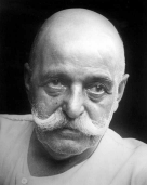From Abracadabra to Zombies | View All
G. I. Gurdjieff (1872?-1949)
George S. Georgiades was a
Greco-Armenian charismatic spiritual leader who was born in Russia but who made a name for himself in
Paris as the mystic George Ivanovitch Gurdjieff. In Russia, he established what he called
"The Institute for the Harmonious Development of Man" (1919), which he
re-established in France in 1922. It was at his Institute that Gurdjieff promoted a litany
of hilarious occult and mystical notions about the universe, which he claimed he was
taught by wise men while traveling and studying in Central Asia. He put down his
"insights" in books with titles like Meetings with Remarkable men, All
and Everything, and Beelzebub's Tales to his Grandson: an objectively impartial
criticism of the life of man. Gurdjieff's obscure
musings were presented in more accessible language by his disciple
Petyr Demianovich Ouspensky.
charismatic spiritual leader who was born in Russia but who made a name for himself in
Paris as the mystic George Ivanovitch Gurdjieff. In Russia, he established what he called
"The Institute for the Harmonious Development of Man" (1919), which he
re-established in France in 1922. It was at his Institute that Gurdjieff promoted a litany
of hilarious occult and mystical notions about the universe, which he claimed he was
taught by wise men while traveling and studying in Central Asia. He put down his
"insights" in books with titles like Meetings with Remarkable men, All
and Everything, and Beelzebub's Tales to his Grandson: an objectively impartial
criticism of the life of man. Gurdjieff's obscure
musings were presented in more accessible language by his disciple
Petyr Demianovich Ouspensky.
To some devotees of Gurdjieff, Ouspensky was an incomplete mystic. Other disciples find Gurdjieff and Ouspensky to be co-gurus. They have much to say about many things, including the moon:
The influence of the Moon upon everything living manifests itself in all that happens on Earth. Man can not tear himself free from the Moon. All his movements and consequently all his actions are controlled by the Moon. The mechanical part of our life is subject to the Moon.*
The moon at present feeds on organic life, on humanity. [In Search of the Miraculous]
What makes a guru such as Gurdjieff attractive as a spiritual conquistador is his seemingly shrewd observation that most human beings who are awake act as if they are asleep. Gurdjieff also observed that most people are dead on the inside. I think he meant by these claims that most people are passive sheep and need a guru to give their lives vitality and meaning. That is to say, I believe Gurdjieff correctly noted that most people are neither skeptics nor self-motivated, and that many are easily duped by gurus because they want someone to show them the way to live a meaningful life. He offered to show his followers the way to true wakefulness, a state of awareness and vitality which transcends ordinary consciousness. He was able to attract a coterie of writers, artists, wealthy widows and other questing souls to work his farm for him in exchange for sharing his wisdom. He offered numerous claims and explanations for everything under the moon, rooted in little more than his own imagination and never tempered with concern for what science might have to say about his musings.
Gurdjieff obviously had a powerful personality, but his disdain for the mundane and for natural science must have added to his attractiveness. He allegedly exuded extreme self-confidence and exhibited no self-doubt, traits which must have been comforting to many people. My favorite Gurdjieff story is told by Fritz Peters. To explain "the secret of life" to a wealthy English woman who had offered him £1,000 for such wisdom, Gurdjieff brought a prostitute to their table and told her he was from another planet. The food he was eating, he told her, was sent to him from his home planet at no small expense. He gave the prostitute some of the food and asked her what it tasted like. She told him it tasted like cherries. "That's the secret of life," Gurdjieff told the English lady. She called him a charlatan and left. Later that day, however, she gave him the money and became a devoted follower. He might have hit her with a stick like some Zen master and obtained the same result.
To those on a quest for spiritual evolution or transformation, guides like Gurdjieff and Ouspesky promise entry into an esoteric world of ancient mystical wisdom. Such a world may seem attractive to those who are drifting at sea and rudderless.
The Gurdjieff Foundation has about two dozen centers, mostly in north America.
There are Gurdjieff-Ouspensky Centers in over 30 countries around the world; they are operated by the Fellowship of Friends and are not associated with the Gurdjieff Foundation but with Robert Earl Burton.
See also enneagram and Ouspensky.
further reading
books and articles
Peters, Fritz. Gurdjieff: containing Boyhood with Gurdjieff [and] Gurdjieff remembered (London: Wildwood House, 1976).
websites
The Thought of Petyr Demianovich Ouspensky by Michael Presley


